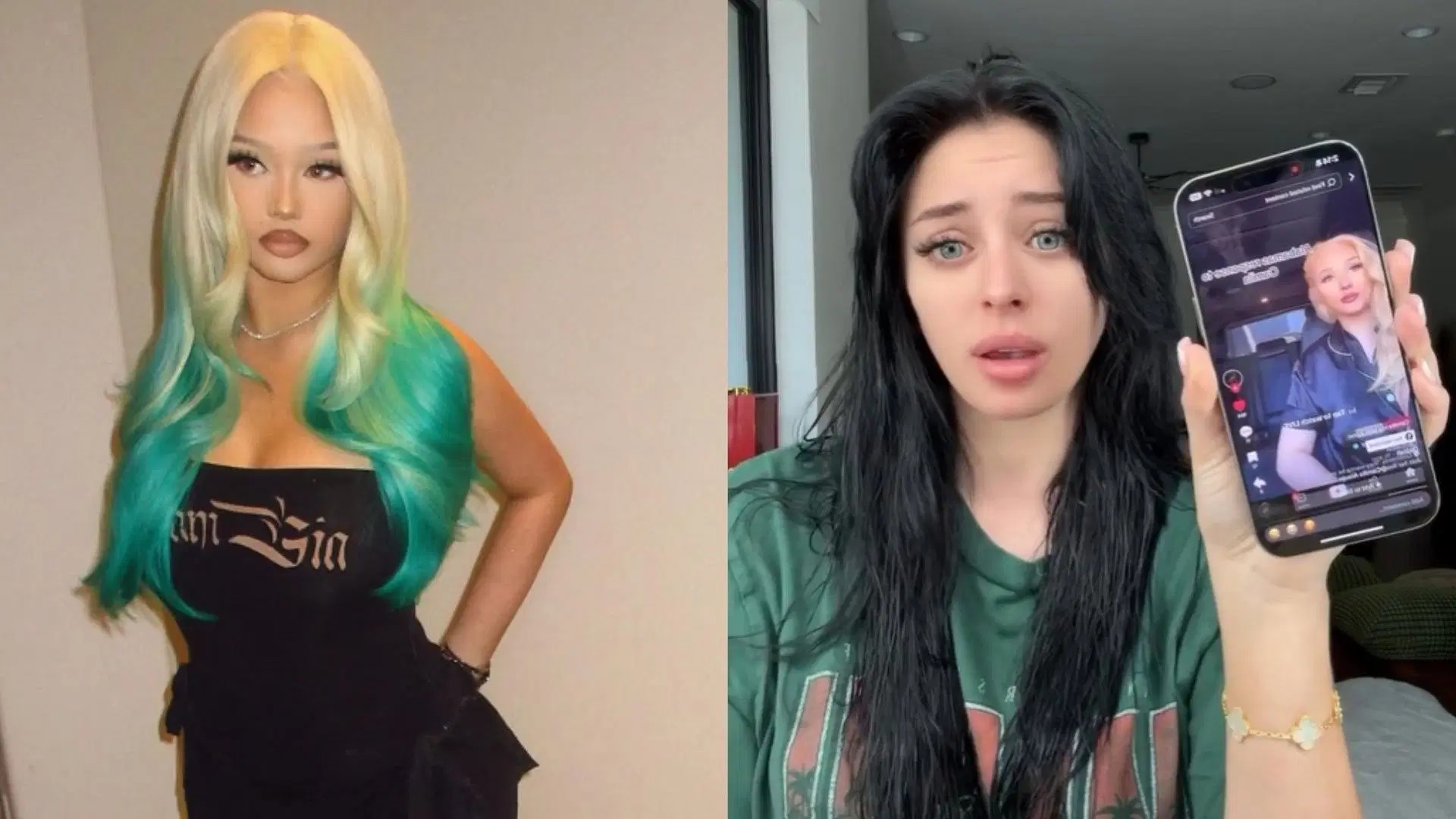Camilla Araujo Leaked Videos Privacy Breach and Digital Ethics in the Spotlight
In the dynamic realm of social media and digital celebrity, controversies often erupt with a speed that matches their global connectivity. One such controversy involves Camilla Araujo, a rising social media influencer whose private videos were leaked, sparking a wave of public debate and intense scrutiny. This incident not only highlights the vulnerabilities of public figures but also raises critical questions about privacy, consent, and the ethics of online content sharing. As we navigate this multifaceted issue, we must examine the origins of the controversy, the impact on both the individual and the broader digital community, and the lessons that can be learned about responsible content consumption.
The leaked videos of Camilla Araujo have become a poignant case study in today’s digital landscape. They illustrate how rapidly information—and disinformation—can spread online, affecting the lives and reputations of those involved. The incident challenges us to consider the balance between public interest and personal privacy. Throughout this article, we will delve into who Camilla Araujo is, the details of the leak, its emotional and professional repercussions, the ethical implications it raises, and how society might respond to such events. Ultimately, this discussion offers an opportunity to reflect on the responsibilities of both content creators and consumers in the age of ubiquitous digital media.
WHO IS CAMILLA ARAUJO?
Before delving into the specifics of the controversy, it is essential to understand the persona at its center. Camilla Araujo emerged as a charismatic and engaging content creator whose online presence resonated with a broad audience. Known for her candid style, vibrant personality, and authenticity, Camilla quickly built a community that appreciated her relatability and creativity. Social media platforms like Instagram, Twitter, and YouTube provided the perfect backdrop for her to showcase her talents, and her steadily growing follower count was a testament to her influence in the digital sphere.
@camilla Since everyone leaked our last address 🙄
Camilla’s journey from a budding influencer to a recognized public figure was characterized by her commitment to authenticity. Her videos and posts often exuded a sense of warmth and spontaneity, making her an appealing figure to a diverse audience. However, this very openness also rendered her vulnerable in an era where digital boundaries are continually blurred. The line between private and public life is precariously thin, and Camilla’s situation underscores the risks inherent in modern digital fame. As her popularity soared, so too did the stakes of maintaining her privacy, a challenge that many influencers face when their personal lives become intertwined with their public image.
Her background, interests, and the style of her content all contributed to a persona that many admired. Yet, when personal videos—recorded in a context meant to be intimate and private—were leaked, the narrative around her quickly shifted from admiration to controversy. The breach of trust in this case serves as a stark reminder that in the digital age, the personal lives of public figures are often subject to the whims of an unpredictable online audience. Camilla Araujo’s story is not merely one of a scandal but a reflection of broader societal issues regarding privacy, digital ethics, and the responsibilities of both creators and consumers in an interconnected world.
THE INCIDENT: UNVEILING THE LEAKED VIDEOS
The controversy erupted when a series of intimate videos featuring Camilla Araujo were leaked online. The incident unfolded rapidly, catching both her fans and the broader online community by surprise. These videos, which were shared without her consent, quickly spread across multiple social media platforms, igniting a firestorm of reactions ranging from shock to voyeuristic intrigue. The initial revelation left many questioning how such an invasion of privacy could occur in a time when digital security is supposed to be paramount.
The leak not only revealed personal moments intended for private viewing but also thrust Camilla into an unwanted spotlight. The breach raised immediate concerns about digital safety and the ease with which sensitive content can be accessed by the wrong hands. Online forums, Twitter threads, and various video-sharing platforms became battlegrounds for debates on the ethics of sharing and consuming leaked content. Many viewers found themselves in a moral quandary—curiosity clashed with the knowledge that watching and sharing such material could contribute to further harm.

The rapid spread of the leaked videos highlights the power of social media to amplify controversies. In a matter of hours, what began as a private violation transformed into a global conversation about privacy rights and ethical conduct online. The incident also demonstrated the challenges faced by content creators in protecting their work and personal lives. Cybersecurity vulnerabilities, along with the sheer volume of digital data circulating on the internet, can turn even the most carefully guarded personal moments into public spectacles.
This unfolding drama serves as a case study in the dangers of digital oversharing and the potential consequences when personal boundaries are breached. The leaked content not only affected Camilla on a personal level but also sparked discussions about the legal and ethical responsibilities of online platforms in curating and controlling the spread of sensitive material. As the online community grappled with the implications of the leak, it became clear that the ramifications of such incidents extend far beyond individual privacy—they touch upon broader issues of trust, respect, and the nature of digital citizenship.
THE IMPACT ON THE INDIVIDUAL: EMOTIONAL AND PROFESSIONAL REPERUSSIONS
For Camilla Araujo, the leak of her private videos was not merely a public relations crisis—it was a deeply personal violation that carried significant emotional and professional consequences. The sudden exposure of intimate content can be a traumatic experience, leaving the individual to cope with feelings of vulnerability, betrayal, and intense public scrutiny. The emotional toll of having one’s private life splashed across the internet can be overwhelming, leading to anxiety, depression, and a loss of control over one’s narrative.
In the wake of the leak, Camilla experienced a rapid and dramatic shift in public perception. Where she was once celebrated for her authenticity and charm, she now faced criticism and invasive curiosity from countless online commentators. The relentless commentary not only questioned her personal life but also scrutinized her professional credibility. For many public figures, a scandal of this nature can result in long-lasting damage to one’s career. Brands and sponsors, who often rely on the positive image and reliability of their endorsers, may distance themselves from a personality mired in controversy.

The professional ramifications extend far beyond temporary embarrassment. In the influencer economy, reputation is a critical asset. A tarnished image can lead to reduced sponsorship opportunities, loss of partnerships, and diminished audience trust. The incident with Camilla serves as a potent reminder that while the internet can catapult individuals to fame, it can just as swiftly undermine their public standing. For someone who built her brand on personal connection and trust, the fallout from the leak was particularly devastating.
Emotionally, the experience of having one’s private life publicly dissected can lead to a deep sense of isolation and despair. Camilla’s ordeal is emblematic of the struggles that many online personalities face when their personal boundaries are crossed. The psychological impact of such invasions is often underestimated, yet it has the potential to derail a promising career and alter an individual’s mental health trajectory. The emotional cost of maintaining a public persona while managing personal vulnerabilities is immense, and incidents like these highlight the urgent need for better support systems and protective measures for those in the public eye.
Moreover, the incident invites broader reflection on the responsibilities of social media users and the ethical dilemmas posed by the consumption of leaked content. It forces us to consider the human cost behind every viral scandal, urging a more compassionate and respectful approach to online discourse. As digital citizens, acknowledging the profound impact that such violations can have on a person’s life is critical in fostering a more empathetic and responsible online community.
ETHICAL, LEGAL, AND SOCIAL IMPLICATIONS
The leak of Camilla Araujo’s videos raises several complex ethical and legal questions that resonate with our current digital landscape. At the heart of the controversy is the issue of consent. The sharing of leaked content without an individual’s permission constitutes not only a violation of privacy but also a fundamental breach of trust. Ethical standards demand that personal, intimate content remains private unless explicitly authorized for public dissemination. The unauthorized release of such material underscores a broader trend in which the boundaries of privacy are increasingly disregarded in the pursuit of clicks and online engagement.

From a legal perspective, the incident poses challenging questions regarding accountability and redress. Laws governing digital privacy and data protection are evolving, yet they often lag behind the rapid advancements in technology. While many countries have enacted legislation aimed at protecting personal data and combating non-consensual content sharing, the enforcement of these laws remains inconsistent. In cases like Camilla’s, determining liability can be a labyrinthine process, involving multiple jurisdictions and the rapid, borderless nature of online communication.
Socially, the widespread distribution and consumption of leaked videos contribute to a culture of voyeurism, where the private lives of individuals are commodified for public consumption. This phenomenon not only diminishes the dignity of the person involved but also sets a dangerous precedent for how society treats personal information. The normalization of such practices can encourage further breaches of privacy, creating an environment in which respect for personal boundaries is continually undermined.
Ethical considerations extend beyond legal ramifications. They compel us to question the role of online platforms and the responsibilities of their users. Should platforms that host and circulate leaked content take a more active stance in preventing the dissemination of non-consensual material? How can users balance their curiosity with the ethical imperative to respect individual privacy? These questions are not easily answered, but they are essential in shaping a digital culture that prioritizes human dignity over sensationalism.
The discussion around Camilla Araujo’s leaked videos serves as a microcosm for broader debates about privacy in the digital age. It highlights the need for a collective re-evaluation of the norms that govern online behavior. In an era where personal data can be disseminated globally in an instant, both individuals and institutions must work together to establish safeguards that protect privacy while promoting ethical digital practices. The lessons drawn from this controversy may well inform future policies and cultural shifts regarding how we interact with and respect the personal boundaries of others.
PUBLIC REACTION AND INDUSTRY RAMIFICATIONS
The public’s response to the leak of Camilla Araujo’s videos was swift and multifaceted. On social media, a cacophony of voices emerged, reflecting a range of emotions—from shock and sympathy to criticism and voyeuristic fascination. This diverse reaction is emblematic of the polarized nature of online discourse today, where every piece of content can elicit both support and condemnation in equal measure.
Many viewers expressed empathy for Camilla, recognizing the profound violation of privacy and the emotional trauma that such an incident could inflict. For these supporters, the leaked videos were not a spectacle to be exploited but a personal crisis that warranted compassion and respect. They called on fellow netizens to refrain from sharing the content further and to consider the real human cost behind the viral headlines.

Conversely, there was also a significant segment of the online community that engaged with the content out of morbid curiosity. This behavior underscores a darker facet of digital culture—one that revels in the exposure of personal vulnerabilities for the sake of entertainment. The phenomenon of “clickbait” and sensationalism has long been a staple of the internet, and the Camilla Araujo incident is yet another example of how scandal can override ethical considerations in favor of rapid content consumption.
The reaction from industry insiders and brands was equally telling. For companies that rely on influencers for marketing and endorsements, a scandal of this magnitude can have severe implications. The controversy forced brands to re-evaluate their partnerships and, in some cases, reconsider their association with a personality whose image had been marred by a public privacy breach. Sponsorship deals, once secured on the basis of a carefully cultivated reputation, suddenly became liabilities in a market where public opinion could shift overnight.
The ramifications of the leak extended to digital platforms as well. Social media companies, already under scrutiny for their role in moderating content, faced renewed pressure to address the circulation of non-consensual material. The incident sparked debates about content moderation policies and the balance between free expression and the protection of individual privacy. Calls for more stringent measures to prevent the spread of leaked content grew louder, reflecting a broader demand for accountability in the digital ecosystem.
This period of intense public reaction and industry fallout underscores a fundamental reality of the digital age: the actions of a few can have widespread consequences. The fallout from Camilla Araujo’s leaked videos serves as a cautionary tale for influencers, brands, and online platforms alike. It highlights the precarious nature of digital fame and the need for robust ethical and legal frameworks to protect individuals in an increasingly interconnected world.
As the dust begins to settle on the Camilla Araujo controversy, it is important to reflect on the lessons that can be drawn from this incident and consider the future implications for digital culture. The challenges posed by leaked content are unlikely to disappear anytime soon, and this case serves as a catalyst for broader discussions about privacy, consent, and the responsibilities of all stakeholders in the digital sphere.
One key lesson from the incident is the urgent need for improved digital security and privacy protections. Influencers and public figures are increasingly vulnerable to breaches that not only jeopardize their personal well-being but also have long-term career implications. In response, there is a growing call for both technological innovations and regulatory reforms that can better safeguard personal data and prevent unauthorized distribution of sensitive content.
Another critical takeaway is the importance of ethical consumption. As consumers of digital media, we hold the power to shape the online environment through our choices. By refusing to engage with or further distribute leaked content, individuals can contribute to a culture that values privacy and respects personal boundaries. This ethical stance is not only a safeguard for public figures but also a reflection of our collective responsibility to promote a more respectful and empathetic digital community.
The future for Camilla Araujo—and indeed for many influencers—will depend largely on the resilience with which they are able to recover from such public crises. History has shown that some public figures manage to reclaim their narrative, reinvent their public persona, and even emerge stronger after scandals. In Camilla’s case, the path forward may involve seeking professional support, reevaluating her digital security protocols, and, importantly, reclaiming her personal narrative on her own terms. Whether through thoughtful public statements or new content that reaffirms her authenticity, there is an opportunity for recovery and reinvention.
Looking at the broader industry, the controversy may well serve as a turning point. It is an impetus for digital platforms, regulatory bodies, and brands to work collaboratively in crafting policies that better protect personal content and penalize unauthorized leaks. Increased awareness and proactive measures could help mitigate similar incidents in the future, ensuring that digital spaces remain safe and respectful for all users.
News -
Daniel Larson Toothbrush Video 2 The Unexpected Viral Sensation
Justin Mohan Video Twitter Unpacking the Buzz and Its Viral Impact
Watch El Pantera Video Reddit The Viral Sensation Taking the Internet by Storm
Watch Gia Duddy And Will Levis Leak Privacy Breach Sparks Controversy Online
Watch Bakso Jendes The Viral Indonesian Meatball Sensation Taking Social Media by Storm
Grup Telegram Viral SMP The Rise of a Digital Community and Its Impact on Online Culture
Viral Ibu Bidan How Social Media is Shaping the Future of Midwifery